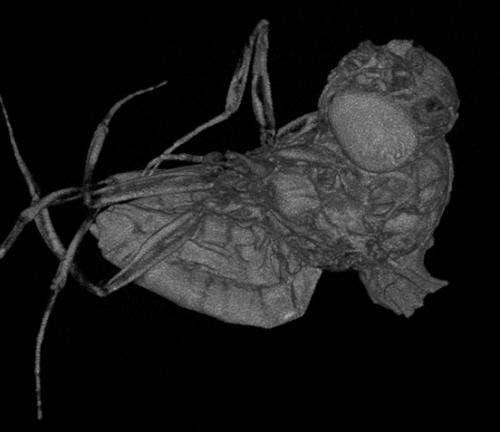Promiscuous fruit flies fight infection by boosting immunity before sex

(Phys.org) —Female fruit flies regulate their genes before having sex to help them fight off sexually transmitted infections (STIs), researchers from our Department of Biology & Biochemistry have revealed.
The finding, published recently in Proceedings of the Royal Society B, is the first evidence of a new type of immunity – 'immune anticipation'. This occurs when animals mount immune responses before they are infected as a direct consequence of sensing a high risk of infection.
The study also shows that how an animal fights off an infection depends on how it picked it up. The authors tested the immunity of the fly under topical and sexual exposures to the same fungus, Metarhizium robertsii. They found that the well-characterized Toll pathway gene, Dif, provides specific immunity to high-dose topical infection, while the relatively unknown Turandot M gene provides specific protection against STIs.
Fruit flies are notorious for their promiscuity and, with STIs rife among the insects, they represented an excellent model for scientists to study. By analysing the genetic make-up and immunity of over 100,000 fruit flies the scientists were able to understand how genes are switched on and off in order to prevent infections.
Lead researcher Dr Nick Priest, said: "It is exciting to learn that females boost their immunity in response to male courtship. In addition to opening up new avenues of research, this finding proves the benefits of sweet talk!"
The scientists at Bath now believe this could lead to new therapies for fighting off infections and it could also help explain autoimmune diseases, such as lupus. In these diseases, environmental triggers cause the body's immune system to become hyperactive and attack healthy tissues.
The research suggests that with a better understanding of the factors in the environment which trigger and suppress anticipated immune responses, health practitioners might be able either to stimulate natural immune responses to help patients ward off infections, or to suppress those responses which cause the immune system to malfunction.
The key next step in this research is to identify the genetic pathways which underlie immune anticipation. By combining studies of tissue-specific gene expression, male courtship song, low-dose fungal infections and immune gene knockdowns assays, the authors hope to identify the genetic links between brain, behaviour and immunity.
More information: To download the paper, Immune anticipation of mating in Drosophila: Turandot M promotes immunity against sexually transmitted fungal infections, see rspb.royalsocietypublishing.or … 73/20132018.abstract
Journal information: Proceedings of the Royal Society B
Provided by University of Bath















